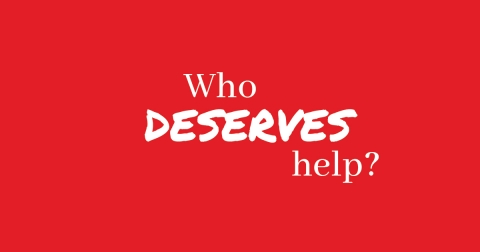Who deserves help?

by Rachel Smith
with support from Feed Nova Scotia
Close your eyes and imagine the most deserving food bank recipient you can think of.
Do they have children? Are they always grateful and do they offer up personal information easily? Are they working two jobs and still can’t make ends meet? Some would see these as being the defining characteristics of a “good” food bank recipient. This is someone we want to help, who checks all the right boxes—someone who is deserving.
People’s private lives often become public when they reach out for help. When accessing food support, people regularly divulge the most intimate details of their lives and stories of their painful struggles. They feel a negotiation is required to prove that they deserve support. In some cases, sharing personal information is required to access some community resources. Imagine how exhausting it must be to constantly jump through hoops, sharing your personal information and trauma with strangers.
I often hear the judgment that people receiving support are “using” or “taking advantage” of the system. Sometimes the judgment is aimed at people with tattoos. Or those using drugs or alcohol. Or people pass judgment of how deserving someone is based on how nice their car is. In other words, if people are asking for help, they better have made a series of perfect life choices to be deemed worthy of support.
Imagine someone has lost thousands of dollars at the casino over the weekend. Do they deserve to access the food bank the following week when they can’t afford to buy groceries? Do you feel differently if you know they have a gambling addiction? What if you knew the story behind their addiction?
Another food bank recipient has no children and accesses disability benefits and income assistance money from the government. Does this person deserve food support? What if you knew how little they lived on? What if you knew they spent most of their time alone and isolated and the food bank was a connection to the community? Is your judgement decreasing? What if you knew they had post-traumatic stress disorder from a work-related incident?
A family has just immigrated to Canada and the transition has been tough. Would you help them find food support? You learn that the parents were a doctor and a professor before they moved, and they’re actively pursuing Canadian accreditation. Does that change how you feel? What if they weren’t looking for work?
It can be so easy to quickly discount people based on superficial judgment. But our drive to help others shouldn’t include caveats. No one should be reduced to a face-value judgment. When someone is hurting, we should help. It really should be that simple.
We can’t know everything about the people accessing food banks, nor should we. Someone’s private life is just that—private. Dignity is stripped away when we set expectations and peer into someone’s life, questioning their choices from a moral high ground. Everyone has the right to food. Period. Let’s lead with kindness and empathy.
Rachel is a bachelor of social work student that did her final practicum at Feed Nova Scotia. She hopes to work in the mental health field and has a passion for social justice. In her spare time, she enjoys spending time with her partner and their two cats and reading horror novels.
We always welcome new contributors to our blog. If you've got something to share, get in touch!